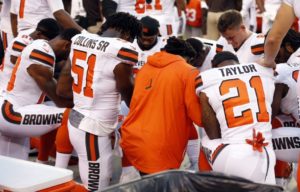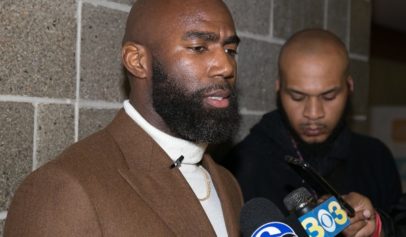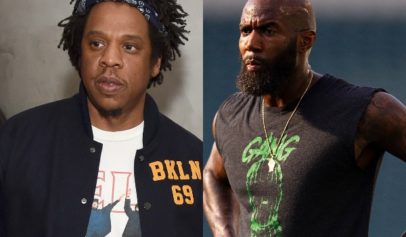
Cleveland Browns players take a knee during the national anthem before a preseason game (Photo credit: Cleveland.com)
For a select few Black athletes, sports and activism are inextricably linked. The same cannot be said for their white counterparts.
As the sun sets on the NFL’s preseason and regular season play looms, the absence of Colin Kaepernick on a 52-man roster has reignited discussions on the intersection of athletics and social justice. That Black athletes shoulder nearly the entire burden of speaking against racial injustice cannot be ignored. Where white athletes speak up, it is often a very tepid “I support the right of expression” response. The very opposite of the final four words of the national anthem people are so up in arms about: “home of the brave.”
When it comes to supporting Black teammates and the Black community, white players have been anything but.
1968 Olympic medalist John Carlos has a compelling reason for why that might be.
Carlos and fellow American Tommie Smith, the bronze and gold medal winners, respectively, in the 200 meters that summer in Mexico City, are immortalized for raising black-gloved fists during their medal ceremony in protest of America’s atrocious treatment of African-Americans. What’s often left out of the story, Carlos says, is the third man involved. The silver medalist, Australian athlete Peter Norman, did not raise a fist, but wore a pin that read “Olympic Project for Human Rights.” “They write Peter out on purpose so white athletes don’t have him as a hero or an example,” Carlos told The Nation last year.
Had Norman not been written out of the history books, his lone example of solidarity would likely not be enough to stem the tidal wave of privilege white athletes inherit that insulates them from having to speak against racial injustice. The sports world holds a large contingent of fans who want its stars to “shut up and play.” White athletes have been all too willing to comply when race is the topic of conversation.
It is worth noting that white players have used their platforms and privilege to shed light on other social issues. Steve Nash was an early opponent of the war in Iraq and spoke out on issues of immigration during his time with the Phoenix Suns. More recently, Golden State Warriors coach Steve Kerr, San Antonio Spurs coach Greg Popovich and Dallas Mavericks owner Mark Cuban all spoke out on recent political events surrounding the campaign and administration of President Donald Trump.
But it was former NFL kicker Chris Kluwe whose fate closely resembled that of former Black NBA players Mahmoud Abdul-Rauf and Craig Hodges, who both found themselves on the out of work after taking bold stands against injustice. Kluwe became an outspoken advocate and ally for same sex-marriage and ultimately believes that stance cost him his job with the Minnesota Vikings. A lawsuit filed against the team was settled out of court.
For better or worse, support from white players on issues of race gets more people to listen, and such was the case when open support from Jackie Robinson’s teammates helped him smash baseball’s color barrier in the 40s. Something Seattle Seahawks linebacker Michael Bennett knew when he stated that the anthem protests would gain steam the moment white players joined.
“It would take a white player to really get things changed,” he said on ESPN. “because when somebody from the other side understands and they step up and they speak up about it. … It would change the whole conversation. Because when you bring somebody who doesn’t have to be a part of [the] conversation making himself vulnerable in front of it, I think when that happens, things will really take a jump.”
And then things began to jump.
Philadelphia Eagles defensive end Chris Long draped a hand over the shoulder of teammate Malcolm Jenkins during a preseason game. Jenkins raised a single fist during the national anthem.
But it was Seth DeValve who displayed the biggest act of solidarity and may have broken the dam if other white players follow. The Cleveland Browns tight end took a knee with his Black teammates before a preseason game. Afterwards, DeValve gave a heartfelt response when asked why.
“The issue is that it doesn’t provide equal opportunity to everybody, and I wanted to support my African-American teammates today who wanted to take a knee,” said DeValve. “We wanted to draw attention to the fact that there are things in this country that still need to change. I, myself, will be raising children that don’t look like me, and I want to do my part as well to do everything I can to raise them in a better environment than we have right now. I wanted to take the opportunity with my teammates during the anthem to pray for our country and also draw attention to the fact that we have work to do. That’s why I did what I did.”
White player support is essential, but there are potential pitfalls that come with participation. Erica DeValve, Seth’s wife, cautioned against portraying her husband as a “savior” in a recent blog that appeared at Very Smart Brothas.
“We should not see Seth’s participation as legitimizing this movement,” she wrote. “Rather, he chose to be an ally of his black teammates. To center the focus of Monday’s demonstration solely on Seth is to distract from what our real focus should be: listening to the experiences and the voices of the black people who are using their platforms to continue to bring the issue of racism in the U.S. to the forefront. Seth, as a white individual, never has and never will truly have to feel the weight and burden of racial discrimination and racial oppression. No white person does or will. But all white people should care and take a stand against its prevalence in this country.”
Additionally, white player support has the potential to become a running tally of who’s doing what, eclipsing the original reason players speaking out.
“I am not going to stand up to show pride in a flag for a country that oppresses black people and people of color,” Kaepernick said last year when first spotted not standing for the anthem. “To me, this is bigger than football and it would be selfish on my part to look the other way. There are bodies in the street and people getting paid leave and getting away with murder.”
White players have a decision to make. Stand (or sit) against injustice or be complicit in silence.
They’re on the clock. And we’re watching.

